
Theoretical ecology is the scientific discipline devoted to the study of ecological systems using theoretical methods such as simple conceptual models, mathematical models, computational simulations, and advanced data analysis. Effective models improve understanding of the natural world by revealing how the dynamics of species populations are often based on fundamental biological conditions and processes. Further, the field aims to unify a diverse range of empirical observations by assuming that common, mechanistic processes generate observable phenomena across species and ecological environments. Based on biologically realistic assumptions, theoretical ecologists are able to uncover novel, non-intuitive insights about natural processes. Theoretical results are often verified by empirical and observational studies, revealing the power of theoretical methods in both predicting and understanding the noisy, diverse biological world.
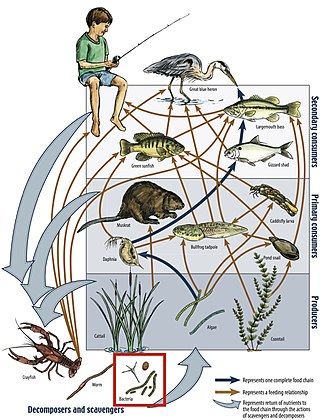
A food web is the natural interconnection of food chains and a graphical representation of what-eats-what in an ecological community. Another name for food web is consumer-resource system. Ecologists can broadly lump all life forms into one of two categories based on their trophic levels, the position it occupies in the food web: 1) the autotrophs, and 2) the heterotrophs. To maintain their bodies, grow, develop, and to reproduce, autotrophs produce organic matter from inorganic substances, including both minerals and gases such as carbon dioxide. These chemical reactions require energy, which mainly comes from the Sun and largely by photosynthesis, although a very small amount comes from bioelectrogenesis in wetlands, and mineral electron donors in hydrothermal vents and hot springs. These trophic levels are not binary, but form a gradient that includes complete autotrophs, which obtain their sole source of carbon from the atmosphere, mixotrophs, which are autotrophic organisms that partially obtain organic matter from sources other than the atmosphere, and complete heterotrophs that must feed to obtain organic matter.

Mathematical and theoretical biology, or biomathematics, is a branch of biology which employs theoretical analysis, mathematical models and abstractions of the living organisms to investigate the principles that govern the structure, development and behavior of the systems, as opposed to experimental biology which deals with the conduction of experiments to prove and validate the scientific theories. The field is sometimes called mathematical biology or biomathematics to stress the mathematical side, or theoretical biology to stress the biological side. Theoretical biology focuses more on the development of theoretical principles for biology while mathematical biology focuses on the use of mathematical tools to study biological systems, even though the two terms are sometimes interchanged.

Population ecology is a sub-field of ecology that deals with the dynamics of species populations and how these populations interact with the environment, such as birth and death rates, and by immigration and emigration.
Computational science, also known as scientific computing, technical computing or scientific computation (SC), is a division of science that uses advanced computing capabilities to understand and solve complex physical problems. This includes

Applied ecology is a sub-field within ecology that considers the application of the science of ecology to real-world questions. It is also described as a scientific field that focuses on the application of concepts, theories, models, or methods of fundamental ecology to environmental problems.
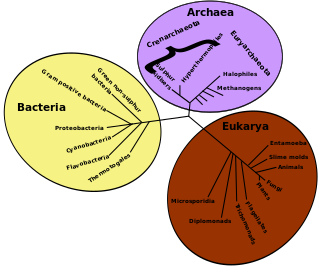
Evolutionary ecology lies at the intersection of ecology and evolutionary biology. It approaches the study of ecology in a way that explicitly considers the evolutionary histories of species and the interactions between them. Conversely, it can be seen as an approach to the study of evolution that incorporates an understanding of the interactions between the species under consideration. The main subfields of evolutionary ecology are life history evolution, sociobiology, the evolution of interspecific interactions and the evolution of biodiversity and of ecological communities.
Ecology is a new science and considered as an important branch of biological science, having only become prominent during the second half of the 20th century. Ecological thought is derivative of established currents in philosophy, particularly from ethics and politics.
Spatial ecology studies the ultimate distributional or spatial unit occupied by a species. In a particular habitat shared by several species, each of the species is usually confined to its own microhabitat or spatial niche because two species in the same general territory cannot usually occupy the same ecological niche for any significant length of time.
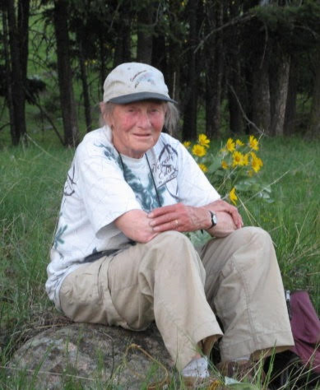
Evelyn Chrystalla "E.C." Pielou was a Canadian statistical ecologist.
Quantitative psychology is a field of scientific study that focuses on the mathematical modeling, research design and methodology, and statistical analysis of psychological processes. It includes tests and other devices for measuring cognitive abilities. Quantitative psychologists develop and analyze a wide variety of research methods, including those of psychometrics, a field concerned with the theory and technique of psychological measurement.

Systems ecology is an interdisciplinary field of ecology, a subset of Earth system science, that takes a holistic approach to the study of ecological systems, especially ecosystems. Systems ecology can be seen as an application of general systems theory to ecology. Central to the systems ecology approach is the idea that an ecosystem is a complex system exhibiting emergent properties. Systems ecology focuses on interactions and transactions within and between biological and ecological systems, and is especially concerned with the way the functioning of ecosystems can be influenced by human interventions. It uses and extends concepts from thermodynamics and develops other macroscopic descriptions of complex systems.
The dynamic energy budget (DEB) theory is a formal metabolic theory which provides a single quantitative framework to dynamically describe the aspects of metabolism of all living organisms at the individual level, based on assumptions about energy uptake, storage, and utilization of various substances. The DEB theory adheres to stringent thermodynamic principles, is motivated by universally observed patterns, is non-species specific, and links different levels of biological organization as prescribed by the implications of energetics. Models based on the DEB theory have been successfully applied to over a 1000 species with real-life applications ranging from conservation, aquaculture, general ecology, and ecotoxicology. The theory is contributing to the theoretical underpinning of the emerging field of metabolic ecology.

An ecosystem model is an abstract, usually mathematical, representation of an ecological system, which is studied to better understand the real system.

Cang Hui is a mathematical ecologist at Stellenbosch University. His research interests are proposing models and theories for explaining emerging patterns of biodiversity, networks and adaptive traits in ecology and evolution.
Ecological forecasting uses knowledge of physics, ecology and physiology to predict how ecological populations, communities, or ecosystems will change in the future in response to environmental factors such as climate change. The goal of the approach is to provide natural resource managers with information to anticipate and respond to short and long-term climate conditions.
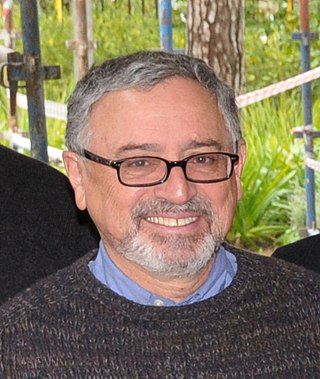
Lev R. Ginzburg is a mathematical ecologist and the president of the firm Applied Biomathematics.
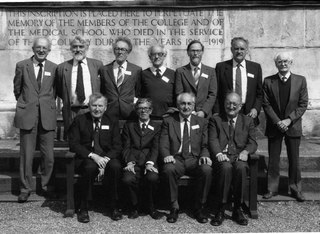
Peter Greig-Smith (1922–2003) was a British plant ecologist, founder of the discipline of quantitative ecology in the United Kingdom. He had a deep influence across the world on vegetation studies and plant ecology, mostly from his book Quantitative Plant Ecology, first published in 1957 and a must-read for multiple generations of young ecologists.

Ecological Orbits: How Planets Move and Populations Grow is a book on population ecology by ecologist Lev R. Ginzburg and philosopher of science Mark Colyvan that argues for an inertial model of population dynamics.











